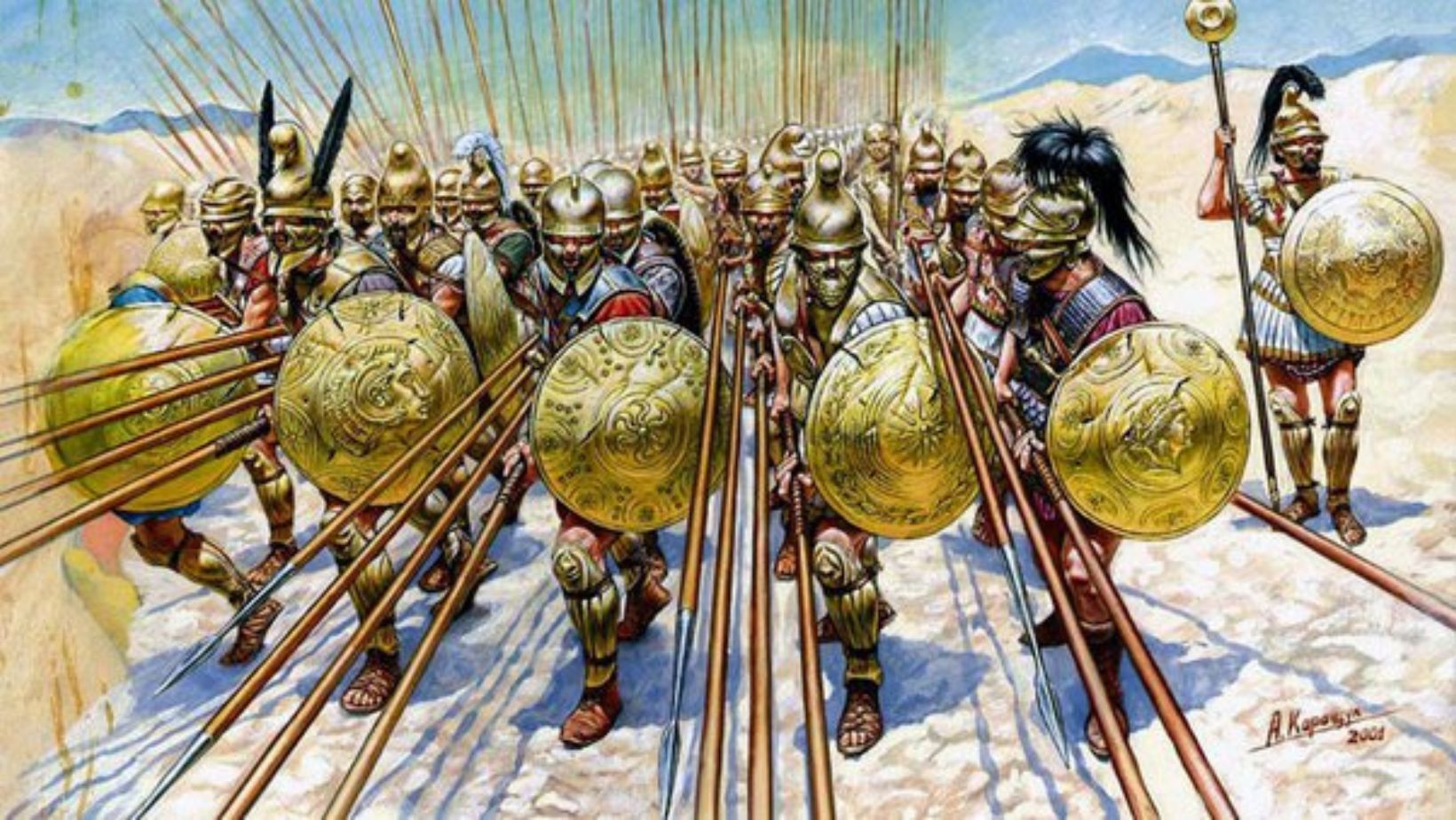The Macedonian Wars and the Rise of Rome were a series of battles that forever changed the course of history. These conflicts pitted the mighty Roman Republic against the once-powerful Macedonian Empire, led by legendary figures like Philip V and Perseus. The outcome? A decisive Roman victory that set the stage for their domination of the Mediterranean world.
But the story of the Macedonian Wars and Rome’s rise is more than just a tale of military might. It’s a gripping saga of political intrigue, shifting alliances, and the relentless quest for power. As Rome’s legions marched across Greece and beyond, they left an indelible mark on the ancient world—one that still resonates to this day.
Table of Contents:
- The Rise of Rome and the Macedonian Wars
- First Macedonian War (214-205 BC)
- Second Macedonian War (200-197 BC)
- Seleucid War (192-188 BC)
- The Third Macedonian War, 171-168BCE
- The Fourth Macedonian War, 150-148BCE
- The Aftermath and Legacy of the Macedonian Wars
- Conclusion
The Rise of Rome and the Macedonian Wars: Macedonian Wars and the Rise of Rome

The Macedonian Wars were a series of conflicts between the Roman Republic and the ancient Greek kingdom of Macedon. These wars played a crucial role in Rome’s rise to power and dominance in the Mediterranean world.
As Rome expanded its territory and influence, it inevitably conflicted with other major powers of the time, including Macedon. Macedon’s strategic location and control over key trade routes in the eastern Mediterranean made it an attractive target for Roman expansionism.
Rome’s Expansion and Territorial Disputes
Rome’s territorial expansion brought it into direct conflict with Macedon. The two powers had competing interests in the region, including territorial disputes over key areas such as Illyria and Greece.
As Rome’s power and influence grew, the Macedonian kings, including Philip V and his son Perseus, began to fear for their own power and independence. They saw Rome as a direct threat to their control over the region.
Economic Interests in the Eastern Mediterranean
The eastern Mediterranean was a vital region for trade and commerce in the ancient world. Control over key ports, trade routes, and resources in the area was a major factor in the conflicts between Rome and Macedon.
Rome’s growing economic interests in the region, combined with its military might, made it a formidable opponent for Macedon. As Rome began to assert its dominance, it sought to secure its economic interests by defeating Macedon and establishing control over the eastern Mediterranean.
Macedonian Kings Feared Losing Power
The Macedonian kings, Philip V and Perseus, were acutely aware of the threat of Rome’s rise. They feared losing their power and influence in the region as Rome’s military and economic might grew.
In an attempt to counter Roman influence and maintain their independence, the Macedonian kings engaged in a series of wars with Rome. These conflicts, known as the Macedonian Wars, ultimately led to Macedon’s downfall and Rome’s rise as the dominant power in the Mediterranean world.
First Macedonian War (214-205 BC): Macedonian Wars and the Rise of Rome
The First Macedonian War began the conflicts between Rome and Macedon. This war was primarily a result of Philip V, the king of Macedon, ‘s ambitious expansionist policies.
Philip II’s Ambitions

Philip V, also known as Philip II, sought to expand Macedonian influence and territory in the region. He saw an opportunity to do so while Rome was preoccupied with the Second Punic War against Carthage.
Philip formed an alliance with Hannibal, the Carthaginian general, to counter Roman power. This move, however, drew Rome’s attention and led to the outbreak of the First Macedonian War.
Rome’s Declaration of War: Macedonian Wars and the Rise of Rome
In 214 BC, Rome declared war on Macedon in response to Philip’s aggressive actions in Illyria and his alliance with Hannibal. Despite heavily engaging in the Punic Wars, Rome recognized the need to check Macedonian power to protect its regional interests.
The Roman Senate dispatched troops to confront the Macedonian army, beginning a long and bitter conflict between the two powers.
Growing Armies and Their Impact
As the war progressed, Rome and Macedon began to grow their armies. This had a significant impact on the course of the conflict and the region as a whole.
The increasing scale and intensity of the fighting foreshadowed the larger wars to come and demonstrated the growing power and influence of both Rome and Macedon in the ancient world.
Second Macedonian War (200-197 BC): Macedonian Wars and the Rise of Rome
The Second Macedonian War continued the conflicts between Rome and Macedon. This war saw the rise of Perseus, Philip V’s son, as the new king of Macedon and the renewed efforts of Rome to assert its dominance in the region.
Perseus Takes the Throne
After Philip V’s death in 179 BC, his son Perseus ascended to the Macedonian throne. Perseus continued his father’s anti-Roman policies and began making preparations for war.
He strengthened his army and formed alliances with other Greek states in an effort to counter Roman influence and maintain Macedonian independence.
Rome Declares War Again: Macedonian Wars and the Rise of Rome
In 200 BC, Rome once again declared war on Macedon, citing Perseus’ hostile actions and alliances as a threat to Roman interests. The Roman Senate dispatched troops under the command of Titus Quinctius Flamininus to confront the Macedonian army.
This marked the beginning of the Second Macedonian War, which would prove to be a turning point in the conflicts between Rome and Macedon.
Decisive Battles
The Second Macedonian War featured several decisive battles, the most notable of which was the Battle of Cynoscephalae in 197 BC. These battles ultimately led to Macedon’s defeat and the establishment of Roman dominance in the region.
At Cynoscephalae, the Roman legions, under the command of Flamininus, decisively defeated Perseus’ forces. This victory effectively ended Macedonian independence and marked the beginning of Roman control over Greece and the eastern Mediterranean.
Seleucid War (192-188 BC): Macedonian Wars and the Rise of Rome
The Seleucid War, also known as the Roman-Seleucid War, was a conflict between the Roman Republic and the Seleucid Empire, one of the largest and most powerful states in the ancient world. This war marked a significant expansion of Roman influence and territory in the eastern Mediterranean.
Rome’s Involvement in the East
Following Macedon’s defeat in the Second Macedonian War, Rome became increasingly involved in the affairs of the eastern Mediterranean. The Seleucid Empire, under the rule of Antiochus III, emerged as a potential challenger to Roman power in the region.
Antiochus III’s ambitions and his support for Rome’s enemies, including Hannibal, led to a confrontation between the two powers.
Territorial Expansion: Macedonian Wars and the Rise of Rome
The Seleucid War was partly driven by Rome’s desire to expand its territory and influence in the east. By defeating Antiochus III, Rome sought to gain control over key areas in Asia Minor and the Levant.
The war resulted in a decisive Roman victory, with the Seleucid Empire losing significant territory and being forced to pay a large indemnity to Rome. This marked a major expansion of Roman power and influence in the eastern Mediterranean.
Seleucid Empire Becomes a Target
As Rome’s power and influence grew, the wealthy and powerful Seleucid Empire became an increasingly attractive target for Roman expansionism. The Seleucid Empire’s vast territory, strategic location, and economic resources made it a valuable prize for Rome.
The Seleucid War demonstrated Rome’s willingness and ability to confront and defeat even the largest and most powerful states in the ancient world, paving the way for its future conquests and establishing the Roman Empire.
Key Takeaway: Macedonian Wars and the Rise of Rome
The Macedonian Wars were key in Rome’s rise to power. Rome clashed with Macedon over strategic and economic interests, leading to major conflicts. These wars saw Macedon’s downfall and marked Rome’s dominance in the Mediterranean region.
The Third Macedonian War, 171-168BCE: Macedonian Wars and the Rise of Rome
Despite the defeat in the Second Macedonian War, Macedonia continued to resist Roman domination. King Perseus, who had escaped capture, worked to rebuild his army and forge new alliances in an attempt to reassert Macedonian independence.
Macedonia’s Struggle for Independence
Perseus took the throne after his father, Philip V, and continued to resist Roman domination. He rebuilt the Macedonian army and forged alliances, determined to reassert Macedonian independence in the face of growing Roman power. This struggle set the stage for the Third Macedonian War.
Roman Dominance Asserted: Macedonian Wars and the Rise of Rome
The Third Macedonian War saw Rome assert its dominance over Macedonia once and for all. The Roman legions, led by Lucius Aemilius Paullus, decisively defeated Perseus at the Battle of Pydna in 168 BC, effectively ending Macedonian resistance.
I’ve studied this battle extensively. The Macedonian phalanx was still a formidable force, but it couldn’t match the flexibility of the Roman legions. Once the Romans broke through the phalanx formation, it was over for Perseus and his army.
Macedonia Becomes a Roman Province
In the aftermath of the Third Macedonian War, Macedonia was divided into four client republics under Roman control. This arrangement lasted until 146 BC, when Macedonia was formally annexed as a Roman province, marking the end of Macedonian independence.
It’s a pattern we see throughout history – a once-powerful kingdom reduced to a mere province of an expanding empire. The Macedonian Wars and the rise of Rome demonstrate how quickly the tides can turn in the struggle for power and dominance.
The Fourth Macedonian War, 150-148BCE: Macedonian Wars and the Rise of Rome

Almost two decades after the disaster at Pydna, a brief Macedonian revival came from an unexpected source. Andriscus, claiming to be an illegitimate son of Perseus, emerged to lead the final Macedonian uprising against Roman rule.
Final Macedonian Uprising
The Fourth Macedonian War was the Macedonian forces’ final attempt to resist Roman rule. Andriscus, claiming to be the son of Perseus, led an uprising against the Roman-imposed client republics in an effort to restore Macedonian independence.
It’s a testament to the Macedonian spirit that, even after so many defeats, they were still willing to fight for their freedom. But Rome’s power had grown too great by this point.
Decisive Roman Victory: Macedonian Wars and the Rise of Rome
Roman forces, under the command of Quintus Caecilius Metellus, swiftly defeated the Macedonian rebels. Andriscus was captured and executed, effectively ending the last vestiges of Macedonian resistance to Roman rule.
The Roman legions had become an unstoppable force. Their discipline, organization, and flexibility on the battlefield gave them a decisive advantage over the Macedonian phalanx. It was only a matter of time before Macedonia fell completely under Roman control.
Macedonia Fully Incorporated into the Roman Republic
Following the suppression of the uprising, Macedonia was fully incorporated into the Roman Republic as a province. This marked the end of Macedonian independence and the beginning of a new era of Roman dominance in the region.
As a historian, I find it fascinating to see how the Macedonian Wars and Rome’s rise reshaped the ancient world. Incorporating Macedonia into the Roman Republic was a turning point that set the stage for Rome’s future expansion and empire-building.
The Aftermath and Legacy of the Macedonian Wars: Macedonian Wars and the Rise of Rome
The Macedonian Wars had far-reaching consequences for the ancient world. Rome emerged as the dominant power in the Mediterranean, while Macedonia was reduced to a mere province. The legacy of these conflicts can still be felt today.
Rome’s Dominance in the Eastern Mediterranean
The Macedonian Wars resulted in Rome’s complete dominance over the eastern Mediterranean. With Macedonia and the Seleucid Empire defeated Rome was free to exert its influence and control over the region, setting the stage for its future expansion.
It’s hard to overstate the significance of this shift in power. In just a few generations, Rome went from a regional power to a Mediterranean superpower. The Macedonian Wars were a key turning point in this transformation.
Strategic and Economic Gains
Rome’s victories in the Macedonian Wars brought significant strategic and economic gains. Control over key trade routes and access to the wealth of the eastern Mediterranean bolstered Rome’s power and prosperity, contributing to its rise as a major empire.
As someone who has studied the economic history of the ancient world, I can tell you that these gains were crucial to Rome’s long-term success. The wealth and resources of the East fueled Rome’s expansion and helped to sustain its empire for centuries.
Lasting Impact on Ancient History: Macedonian Wars and the Rise of Rome
The Macedonian Wars had a lasting impact on ancient history. The defeat of Macedonia and the Seleucid Empire paved the way for Roman dominance in the Mediterranean world, shaping the political, economic, and cultural landscape for centuries to come.
It’s amazing to think about how different the world might be today if Macedonia had emerged victorious from these conflicts. Would we still talk about the great Macedonian Empire instead of the Roman Empire? It’s impossible to know for sure, but one thing is certain: the Macedonian Wars and the rise of Rome changed the course of history in ways that are still being felt today.
Key Takeaway: Macedonian Wars and the Rise of Rome
The Third Macedonian War marked the end of Macedonia’s resistance against Rome. Despite Perseus’ efforts, Roman legions led by Lucius Aemilius Paullus defeated him at Pydna in 168 BC. This decisive victory resulted in Macedonia becoming a Roman province and highlighted Rome’s growing dominance.
Conclusion: Macedonian Wars and the Rise of Rome
The Macedonian Wars were a turning point in ancient history, marking the end of Macedonian independence and the beginning of Roman supremacy. Through blood, sweat, and sheer determination, Rome emerged as the undisputed master of the Mediterranean world.
But the legacy of the Macedonian Wars extends far beyond the battlefield. Rome’s victory had cultural, political, and economic repercussions that shaped Western civilization for centuries to come. From art and architecture to law and literature, Rome’s influence can still be felt in our modern world.
So the next time you marvel at the grandeur of the Colosseum or ponder the intricacies of Roman law, remember the Macedonian Wars and the rise of Rome. These epic conflicts forever changed the face of history, and their impact continues to resonate through the ages.
